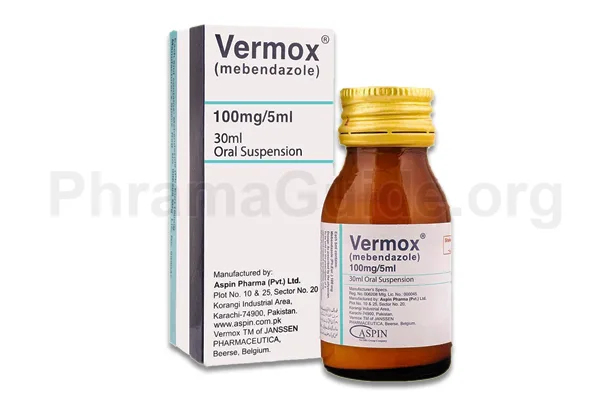Vermox syrup is a medication used to treat intestinal parasitic worm infections such as pinworm, roundworm, and hookworm. It is a type of anthelmintic, which means that it kills worms. Vermox syrup composition is used for children and adults where a low dose of medicine is needed. The following are some common uses and indications of Vermox Syrup:
- Intestinal Worm Infections: Vermox syrup is primarily used to treat infections caused by intestinal worms such as pinworms (Enterobius vermicularis), whipworms (Trichuris trichiura), roundworms (Ascaris lumbricoides), and hookworms (Ancylostoma duodenale, Necator americanus).
- Threadworm Infections: Vermox syrup is effective in treating threadworm infections (also known as pinworm or seatworm infections). These infections are caused by Enterobius vermicularis and commonly affect children.
- Trichinosis: Vermox syrup may be used as part of the treatment for trichinosis, a parasitic infection caused by the roundworm Trichinella spiralis. This infection is usually acquired by consuming undercooked or raw meat.
- Larva Migrans: Vermox syrup may be used to treat larva migrans, a condition caused by the migration of larvae from animal hookworms. It can cause skin inflammation and an itchy rash.
Off-label Uses of Vermox Syrup
- Protozoal Infections: Vermox may be used off-label to treat certain protozoal infections, such as Giardia lamblia or Cryptosporidium parvum. However, other medications like metronidazole or nitazoxanide are more commonly prescribed for these infections.
- Alveolar Echinococcosis: Vermox can be used off-label as part of the treatment regimen for alveolar echinococcosis, a rare parasitic infection caused by the tapeworm Echinococcus multilocularis. It is usually combined with other medications and surgical interventions for optimal management.
- Strongyloidiasis: Vermox may be used off-label to treat strongyloidiasis, an infection caused by the parasitic roundworm Strongyloides stercoralis. However, the preferred treatment is usually with ivermectin.

What is Vermox?
Vermox Syrup is one of the leading brands of Mebendazole in oral liquid form, manufactured and marketed by Aspin Pharma (Pvt) Ltd, Pakistan, Under the licenses of Janssen Pharmaceutica, Belgium.
Vermox Alternatives : Other Similar Brands
The following are some alternative brands of Vermox Syrup and their manufacturers.
- Deworm : Merck (Pvt) Ltd.
- Erizole : Efroze Chemical Industries (Pvt) Ltd, Pakistan.
- Nemazole : GlaxoSmithKline (GSK).
- Vermacid : Wilsons Pharmaceuticals, Pakistan.
- Vermol : W.Woodward Pakistan (Pvt) Ltd.
- Geozole : Geofman Pharmaceuticals, Pakistan.
- G-Worm : Olive Laboratories, Pakistan.
- Mebnagen : Genera Pharmaceuticals, Pakistan.
- Mebizin : Sharooq Pharmaceuticals, Pakistan.
- Sphinx : Libra Pharmaceuticals (Pvt) Ltd, Pakistan.
Vermox : Available Formulations and Strengths
Presently, Vermox is available in Syrup and Tablet forms with the following strengths.
Vermox Syrup : 100mg/5ml strength.
Vermox Tablet : 100mg and 500mg strengths.
Who Should Not Use Vermox?
Vermox syrup has certain contraindications, which are situations or conditions in which the use of Vermox is not recommended due to potential risks.
Hypersensitivity: Vermox syrup should not be used in individuals who have a known hypersensitivity or allergic reaction to Vermox or any of its components. Allergic reactions can range from mild skin rashes to severe allergic reactions that may require immediate medical attention.
Pregnancy: Vermox is generally not recommended during pregnancy, particularly during the first trimester. Although no conclusive evidence of harm to human fetuses has been established, there is limited data available. It is important to consult a healthcare professional to assess the risks and benefits before using Vermox syrup during pregnancy.
Breastfeeding: It is not well-established whether Vermox is excreted in breast milk. Therefore, caution should be exercised when considering the use of Vermox syrup while breastfeeding. A healthcare professional can provide guidance on the appropriate course of action.
Severe Liver Dysfunction: Vermox is primarily metabolized in the liver, so individuals with severe liver dysfunction may experience an accumulation of the medication. In such cases, Vermox should be used with caution or avoided altogether. A healthcare professional should evaluate the individual’s liver function before prescribing Vermox syrup.
What is the Recommended Daily Dosage of Vermox Syrup?
Vermox Syrup Dose for Intestinal Worm Infections (including pinworms, whipworms, roundworms, and hookworms):
Adults and Children (over 2 years):
- 100 mg (10 ml of 100 mg/5 ml syrup) taken as a single dose, usually repeated after 2 weeks if necessary.
Children (1 and 2 years):
- 50 mg (5 ml of 100 mg/5 ml syrup) taken as a single dose, usually repeated after 2 weeks if necessary.
Vermox Syrup Dose for Threadworm Infections (pinworms):
Adults and Children (over 2 years):
- 100 mg (10 ml of 100 mg/5 ml syrup) taken as a single dose.
- A second dose may be recommended after 2 weeks if necessary.
Children (1 and 2 years):
- 50 mg (5 ml of 100 mg/5 ml syrup) taken as a single dose.
- A second dose may be recommended after 2 weeks if necessary.
How Vermox Works?
Vermox binds to tubulin, a protein essential for the formation of microtubules, which are crucial for the normal structure and function of the worm’s cells. By binding to tubulin, it disrupts microtubule assembly, preventing their polymerization and inhibiting cell division in the worms.

Leave A Comment